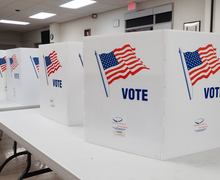iSchool to blackout website during protest of SOPA
Wikipedia, Mozilla Firefox and WordPress are go-to web platforms for most college students — used for everything from research to socializing. And on Wednesday, they’re shutting down.
As part of a movement against the Stop Online Piracy Act, the high-profile web influencers will shut down for the day in protest of certain provisions of the act. The School of Information Studies at Syracuse University will be joining them by blacking out its academic homepage and its blog, Information Space.
SOPA and its Senate counterpart, Protect IP Act, are acts currently under development in Congress containing provisions that could put user-generated websites, such as Facebook, YouTube and Twitter, at risk of being shut down or forever altered due to the ability of copyright holders to ‘blacklist’ websites where users post content. Such provisions would impose a serious limitation on the freedom of speech.
‘This would dramatically change the way the Internet works and for the first time put the government, and potentially special interests, in control of the content we are allowed to share,’ said Anthony Rotolo, assistant professor of practice at the iSchool. ‘There is great potential that SOPA and PIPA would stifle innovation in the technology sector.’
Information Space, a popular resource about information studies for students and external readers, will undergo a complete blackout all day, leaving only a single post about SOPA and PIPA, Rotolo said. The iSchool’s website will completely blackout its regular features, aside from aspects pertaining to incoming students, for taking down such resources could be detrimental.
As a professor of social media, Rotolo is particularly concerned about SOPA and PIPA’s effect on the information field itself. Sharing information through social media networks is the dominant online activity for many people, especially students who rely on such channels for everything from research to collaboration to socialization, he said.
Information users are increasingly adopting the practice of sharing and re-sharing information through social media websites, often remixing it depending on audiences. This information curation process is the core of many social media innovations in business, education and entertainment, and it is responsible for spreading ideas that have fueled recent social and political movements internationally, Rotolo said.
‘Social networks like Facebook, Twitter and Foursquare, along with information giants like Google’s YouTube, are some of the few companies doing well in difficult economic times,’ Rotolo said. ‘This legislation would challenge these companies at a time when their continued growth is most important.’
Rotolo said he personally hopes the blackouts will spark a discussion about the issue within the SU community because the technologies allowing information to be broadly shared with the community, such as Twitter and Facebook, are the same technologies being threatened.
iSchool officials are aiming for the blackouts to raise awareness of SOPA and PIPA and the significant effect they could have on the information field. Students at the iSchool are responsible for building the next innovative technologies and leading companies through the social media revolution. To spark the curiosity of such issues among students, Rotolo said, it is essential they join in the blackout movement.
And they are. Students in particular are getting involved, transferring 25,000 domains from GoDaddy, which initially supported SOPA, to different registrars as a protest against SOPA, said Isaac Budmen, a senior policy studies and information management major and author of the post on SOPA that will be left on the blog.
‘Wikipedia’s shutting down, Mozilla’s shutting down, and high traffic resources and communities are shutting down,’ Budmen said. ‘We at the iSchool have the same ideals, so we figured this is something we really need to be a part of as well.’
The blackout will also remind everyone of how dependent people have become on user-generated content, Rotolo said. Twenty-four hours without Wikipedia will affect thousands of people who utilize the site daily as a quick reference tool or a starting point for further research. Wikipedia and similar innovations are being challenged under SOPA and PIPA, so losing access to the service for one day will remind people the resources at stake.
‘I hope to see SOPA be killed. I don’t want any incarnation of it existing,’ Budmen said. ‘But more positively, I’d like to see more open sources of the act from the beginning: projects, creations, ideas. We’re entering an age where the more open something is, the more relevant it becomes and the more powerful the piece of technology or art becomes.’
Published on January 17, 2012 at 12:00 pm
Contact Marwa: meltagou@syr.edu | @marwaeltagouri





